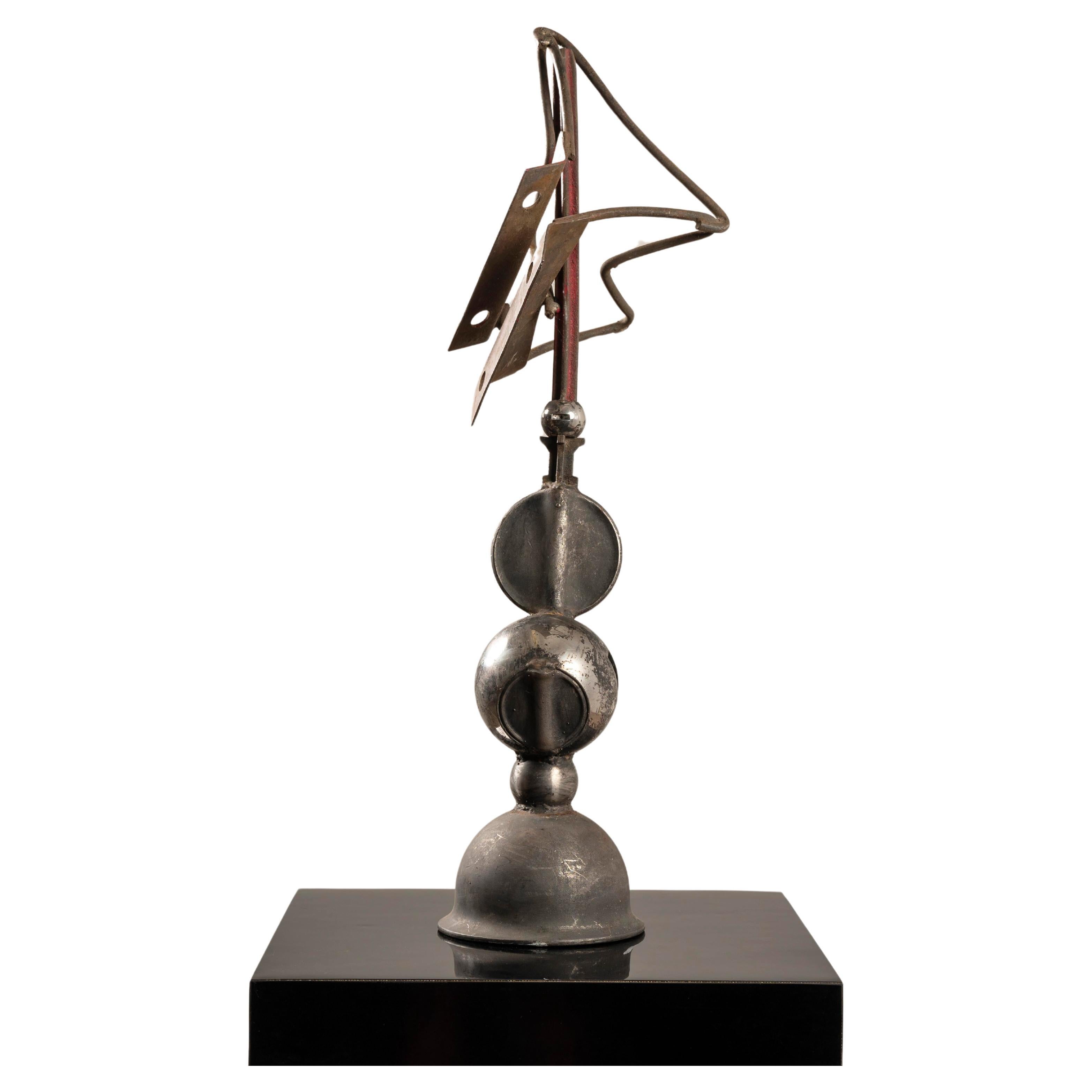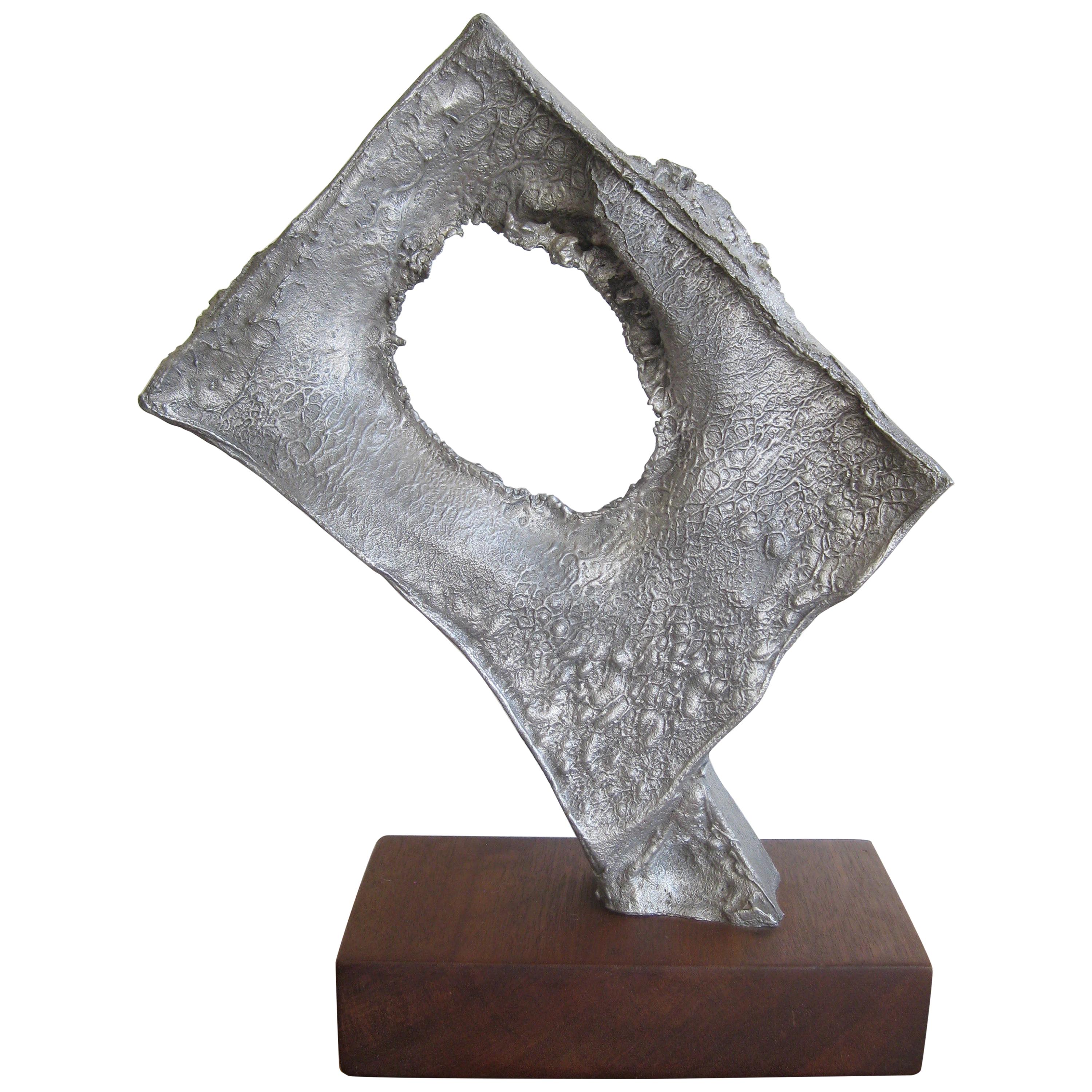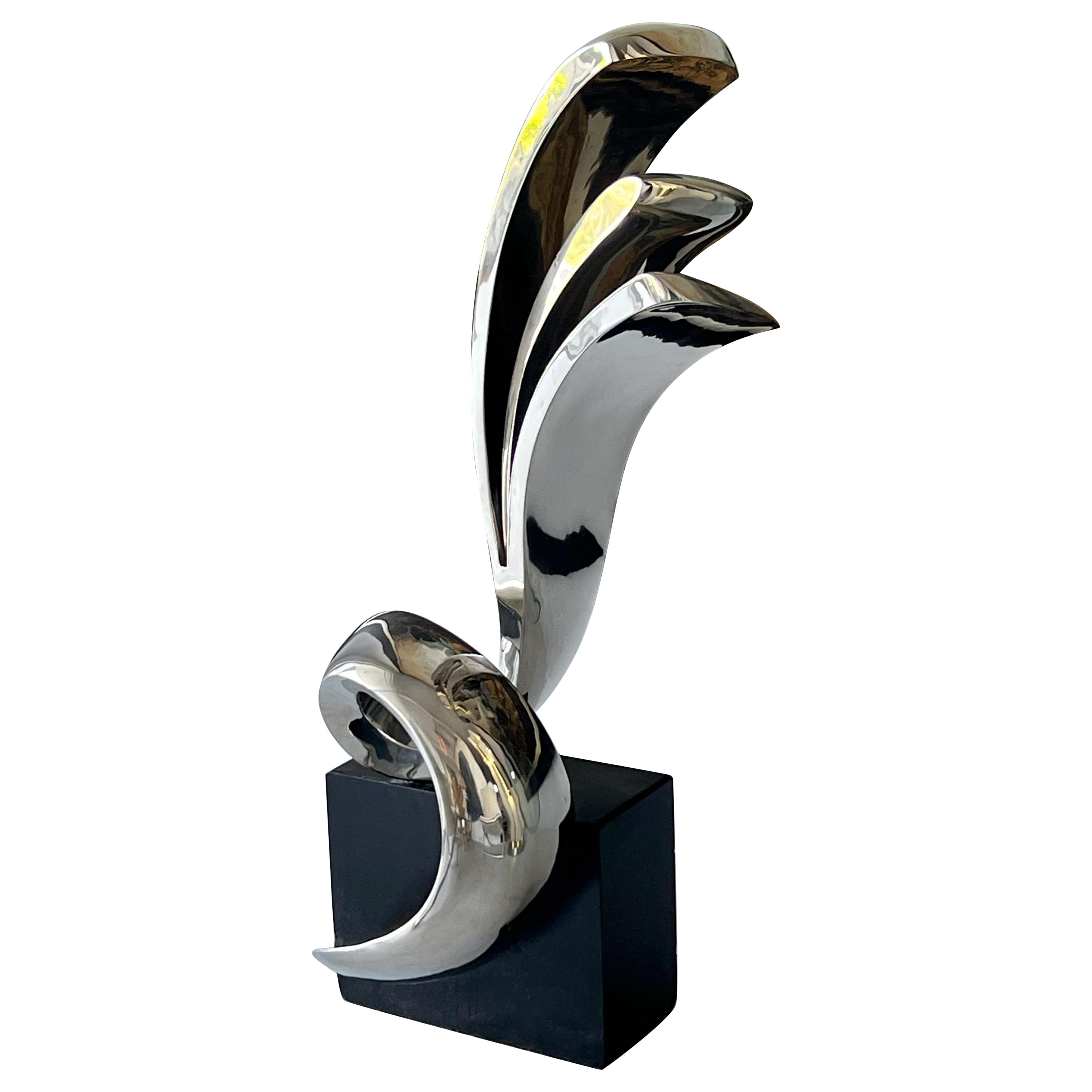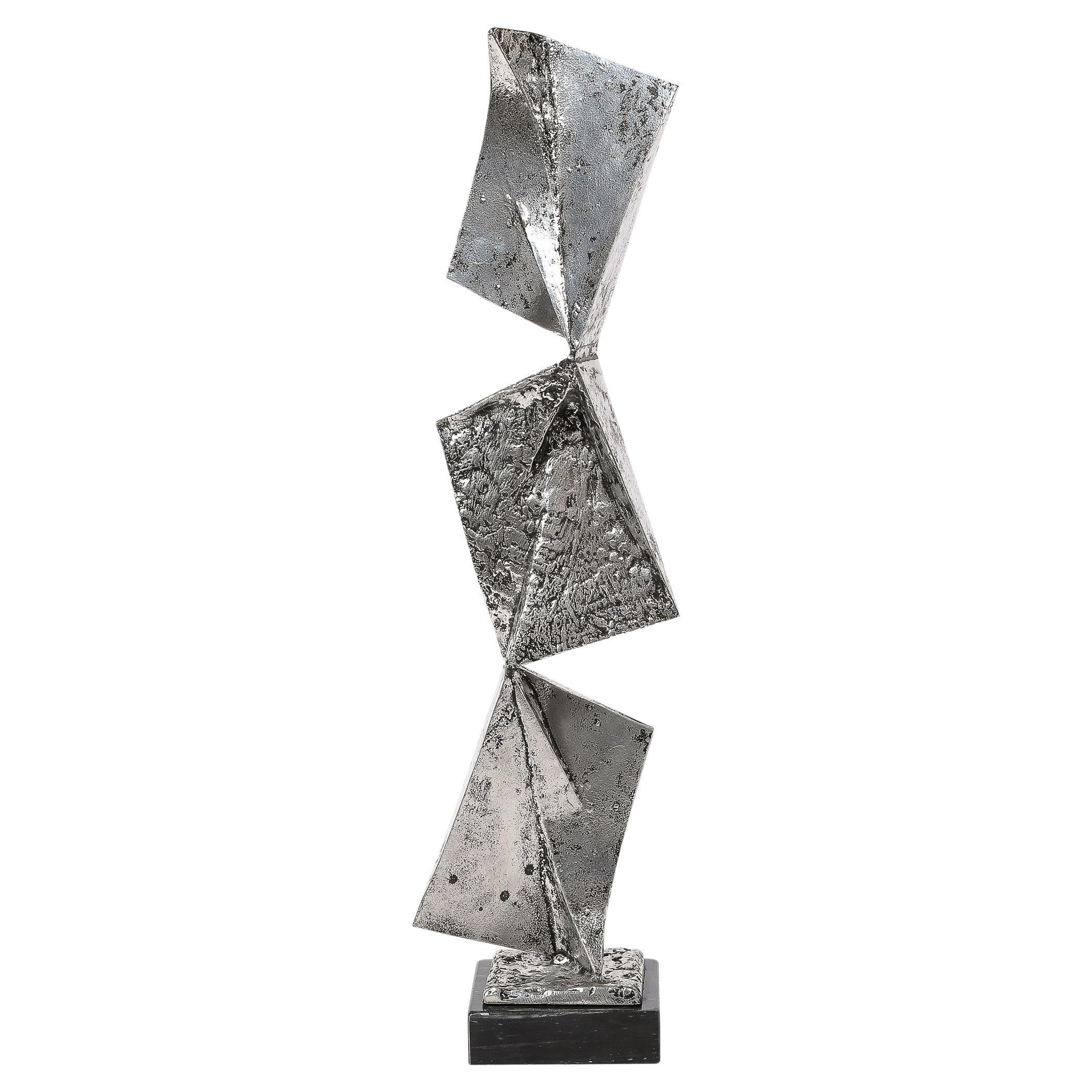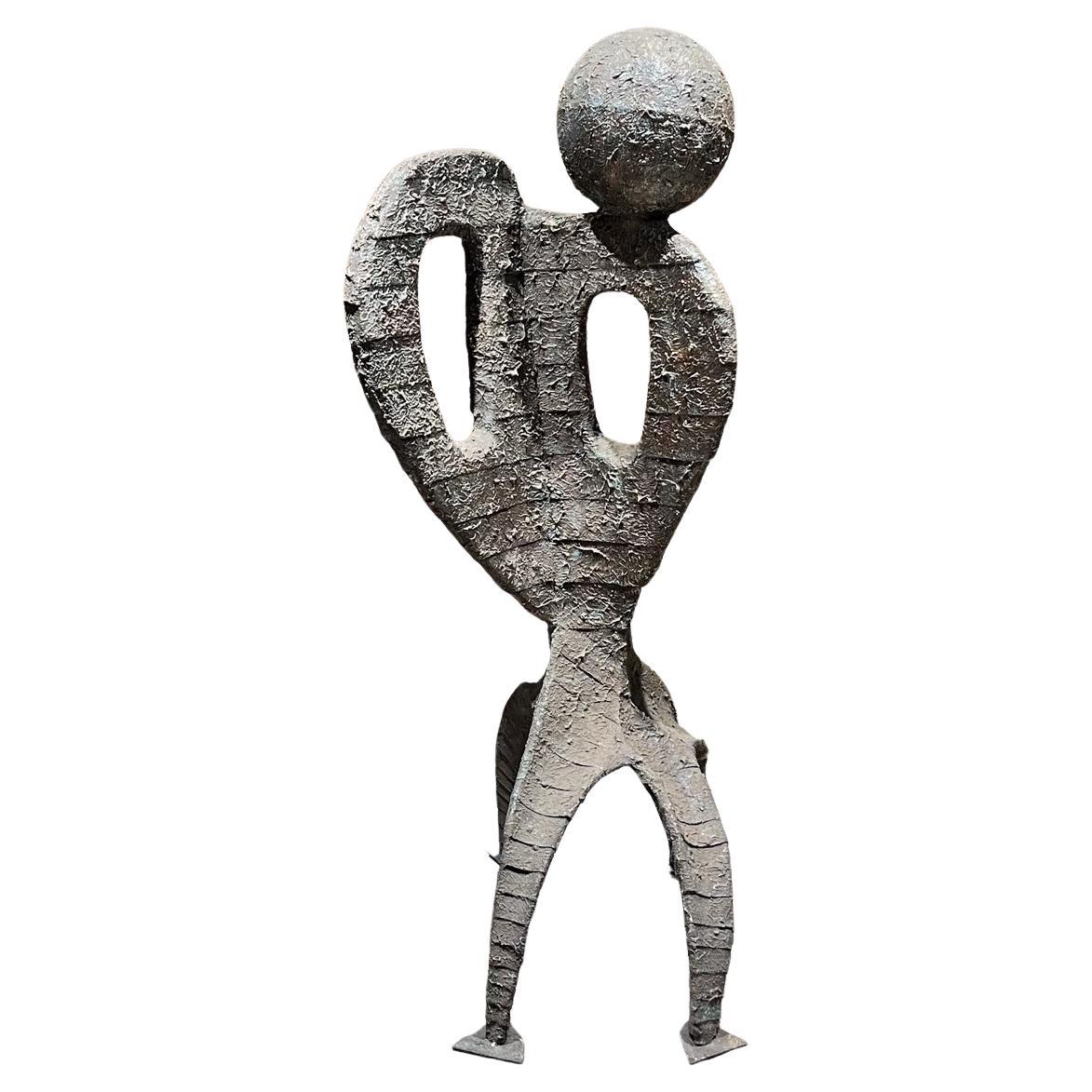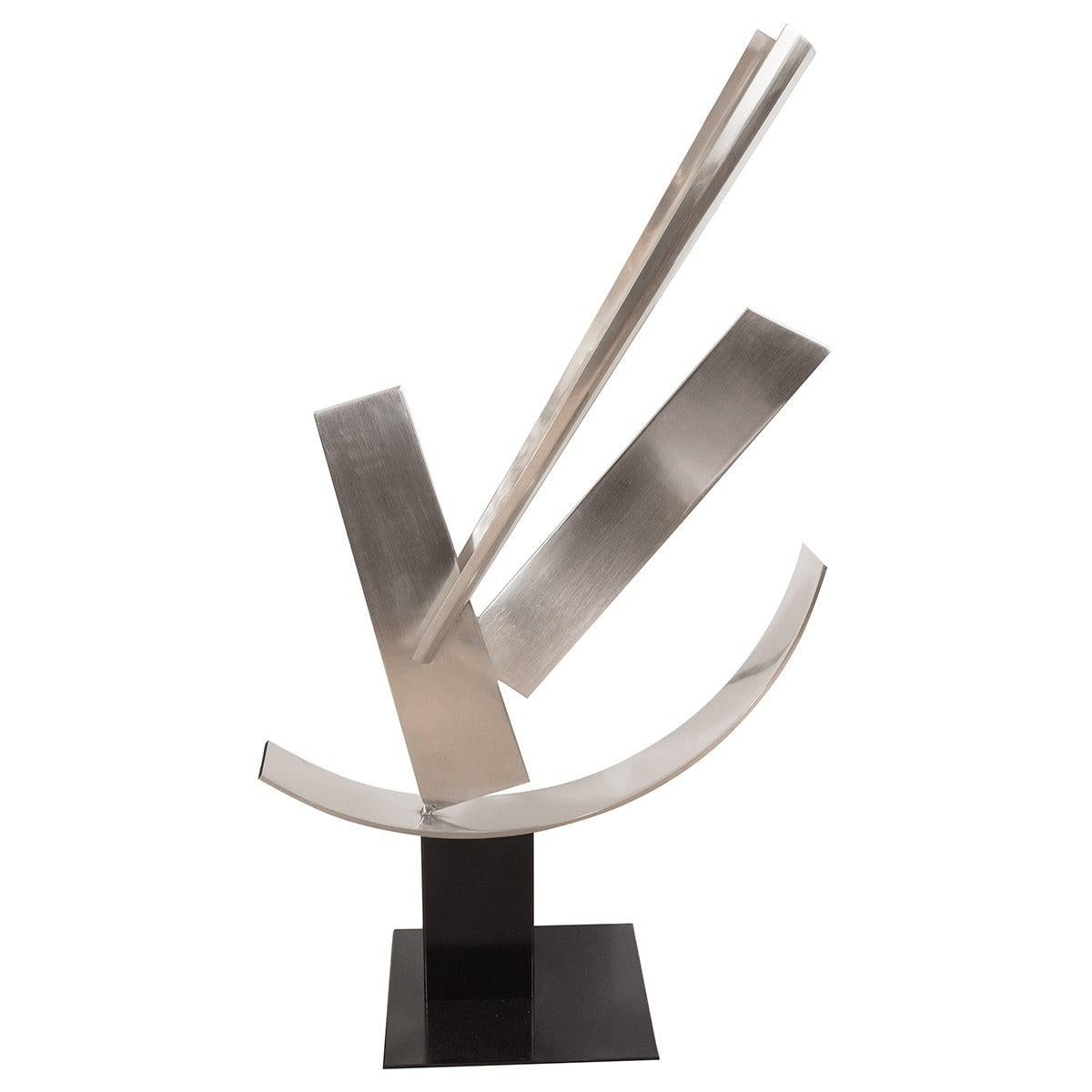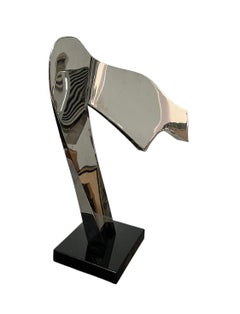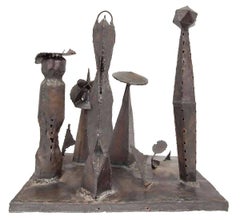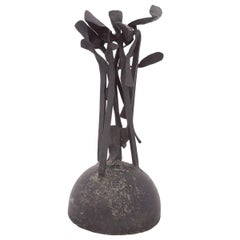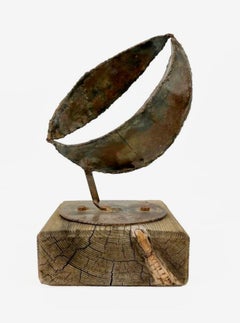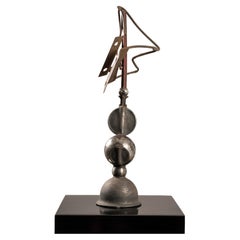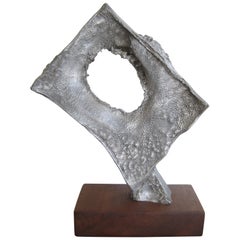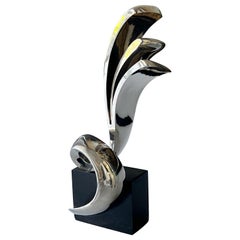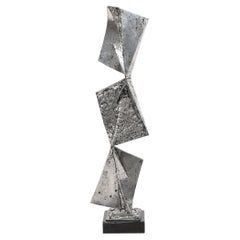Items Similar to Grand Kabuki Stainless Steel Abstract Brutalist Sculpture
Want more images or videos?
Request additional images or videos from the seller
1 of 6
Alfred Van LoenGrand Kabuki Stainless Steel Abstract Brutalist Sculpture
$2,800
£2,106.74
€2,433.33
CA$3,957.13
A$4,294.09
CHF 2,275.49
MX$52,664.93
NOK 28,159.02
SEK 26,608.78
DKK 18,166.02
About the Item
Alfred Van Loen 1978 (1968 in casting?) signed 18 1/2" x 5 1/2" abstract stainless steel sculpture "Grand Kabucki", mounted on wood base, overall size 21 1/2" x 7"
If there are any gaps in Van Loen's life as a U.S. citizen, they come in the early-1950s when he abandoned the Bohemian life of a young, promising New York artist and traveled to Mexico and briefly to Europe. In 1958, he married Helen Roberts (his second marriage ended in divorce and his first marriage, in pre-war Europe, is shrouded in mystery). ....Another room, the dust-free vault, contains a representative array of the work for which he is best known. Van Loen's reputation is built on his works as a direct carver a sculptor who carves into stone without preliminary blueprints, models or drawings. "They are a waste of time," he says. "I never start a piece until I see it finished in my mind." In all of these endeavors, Van Loen is a man in love with the materials. He is an artist who is part scientist, part architect, part explorer and part inventor. "I can only take credit when I feel I have taken a piece of nature and returned it to a natural form giving it just a different kind of life. And then I am happy about it." Van Loen looks sturdy and robust, despite recurring bouts of ill health related to diabetes. He is a tall, lean man whose strong face is chiseled with elean lines across his forehead. His translucent, gray-blue eyes are set beneath well-defined brows, and his head has the craggy but proud look of a Bighorn ram, his graying hair sweeping in a single curl behind each ear. He is a man of uninhibited confidence and ego, displayed in a voice still accented with German that booms out each sentence. But he is also a creature of humility groomed by his awe and reverence for God's work, for the art of every living thing. Van Loen is a prolific and steady worker with uncompromising ideals personally and professionally. He is a teacher who is fair but not lenient. He is a father who is playful but not unmindful of his responsibilities as a parent. wife - Van Loen further isolated himself from the cultural capital and "the sickness of the art world in New York City." Since then, Van Loen has become a bigger star in a smaller galaxy, with a devoted following of patrons and students. Whether casting medals, drawing in unbroken lines (similar to those of Picasso and Calder), painting in watercolors or carving stones and wood, Van Loen is the quintessential craftsman. The real Van Loen is in all of his work. He finds endless lines of continuity and form in the trees and birds and plants that surround him. His two lives. One begins in Germany, where he was born in 1924. The other picks up in 1947 when he arrived in New York. At age six, he says, his wealthy, Jewish parents Karl and Hedwig Lowenthal, owners of a sporting good store sent him to school at a Dominican cloister in Venlo, Holland. In 1938, forced to flee Nazi persecution in Germany, the family moved to Amsterdam, where Alfred joined them. A small carved crucifix which he produced caught the eye of a sponsor who enrolled him in the Royal Academy of Art in Amsterdam in 1941. Surrounded by the cruelty and destruction of war, the young artist became involved in the underground, spying and distributing anti-Nazi pamphlets. Betrayed by his best friend, he was arrested by the Gestapo and spent 16 months in Auschwitz. When he got out, he says, he had only 72 pounds distributed on his 6-foot, 2-inch frame. He did not expect to live. AFTER HIS RECOVERY, he changed his family name, Lowenthal, to Van Loen and returned to the Royal Academy to finish the formal and classical training in anatomy, architectural drawing, pottery, carpentry and casting. By the time he graduated, the war was over, and he decided to come to the United States. When Van Loen talks about this part of his background, the details are sketchy, sometimes contradictory. He does not dwell on that period of his life, and he will not be pressed for specifics. "People should never forget the atrocities of that war," he says. "But they should not continue, living with the memories of it." There are happier memories of his life in the United States, which began April 4, 1947, when a rebuilt troop transport brought 800 emigrants, including the 22-year-old Van Loen, to New York.
Alfred VAN LOEN (1924-1994) German/Dutch/American
Birth place: Oberhausen-Osterfeld, Germany
Profession: Sculptor, educator
Studied: Royal Acad. Art, Amsterdam, Holland, 1941-46.
Exhibited: PAFA Ann., 1950, 1954, 1960; NAD, 1964; WMAA,1957, 1967; Emil Walters Gal., NYC, 1968; Stony Brook Mus., 1968; Heckshere Mus., Huntington, NY, 1971; Harbor Gal., Cold Spring Harbor, NY, 1970s. Awards: first prize, Village AC, 1949; Louisa Robbins Award, Silvermine Guild Artists, 1956; first prize sculpture, Am. Soc. Contemporary Artists, 1964.
Member: AEA; Am. Soc. Contemp Artists; Am. Crafts Council; Long Island Univ. Pioneer Club; Huntington Artists Group.
Work: MMA; MoMA; Brooklyn Mus., NY; Nat. Mus., Jerusalem, Israel. Commissions: brass fountain, James White Community Center, Salt Lake City, UT, 1958; Peace Window, Community Church, New York, 1963; Crescendo, State Univ. NY Agric. & Tech. College Farmingdale, 1969; Jacob's Dream (brass), Little Neck Jewish Center, NY, 1970; bronze & acrylic portrait of Guy Lombardo, Hall of Fame, Stony Brook, NY, 1972.
Preferred media: stone, acrylic.
Publications: "Simple Methods of Sculpture," Channel Press, 1958; "Instructions to Sculpture," C.W. Post College, 1966;
"Origin of Structure and Design," Hamilton Press, 1967;
"Drawings by Alfred Van Loen," Harbor Gallery Press, 1969.
Teaching: instructor, Hunter College, 1953-54
instructor, North Shore Community ACr., NY, 1955-61;
asst. professor sculpture, C.W. Post College, Long Island Univ., 1962-.
- Creator:Alfred Van Loen (1924 - 1994, American)
- Dimensions:Height: 21.5 in (54.61 cm)Width: 7 in (17.78 cm)
- Medium:
- Movement & Style:
- Period:
- Condition:
- Gallery Location:Surfside, FL
- Reference Number:1stDibs: LU38211744652
About the Seller
4.9
Platinum Seller
Premium sellers with a 4.7+ rating and 24-hour response times
Established in 1995
1stDibs seller since 2014
1,807 sales on 1stDibs
Typical response time: 1 hour
- ShippingRetrieving quote...Shipping from: Surfside, FL
- Return Policy
Authenticity Guarantee
In the unlikely event there’s an issue with an item’s authenticity, contact us within 1 year for a full refund. DetailsMoney-Back Guarantee
If your item is not as described, is damaged in transit, or does not arrive, contact us within 7 days for a full refund. Details24-Hour Cancellation
You have a 24-hour grace period in which to reconsider your purchase, with no questions asked.Vetted Professional Sellers
Our world-class sellers must adhere to strict standards for service and quality, maintaining the integrity of our listings.Price-Match Guarantee
If you find that a seller listed the same item for a lower price elsewhere, we’ll match it.Trusted Global Delivery
Our best-in-class carrier network provides specialized shipping options worldwide, including custom delivery.More From This Seller
View AllWelded Stainless Steel Reflective Abstract Modernist Sculpture Gary Kahle
Located in Surfside, FL
Gary Kahle (American, 1942- )
Metal abstract sculpture on black base,
Hand signed and dated 1984
25 1/2" H x approximately 18" W x and 12 1/2" D.
Proven...
Category
1980s Abstract Abstract Sculptures
Materials
Stainless Steel
Mid Century Modern Brutalist Welded Expressionist Sculpture After Paul Evans
Located in Surfside, FL
In this bronze sculpture the artist (unknown) has welded together a group of totems or monuments into a unified piece. T
Neo-Dada Abstract Sculpture: Assemblages
In contrast, abstra...
Category
Mid-20th Century Abstract Expressionist Abstract Sculptures
Materials
Metal
Mid Century Modern Brutalist Welded Abstract Expressionist Sculpture
Located in Surfside, FL
Neo-Dada Abstract Sculpture: Assemblages
In contrast, abstract sculpture followed a slightly different course. Rather than focusing on non-figurative subject matter, it concentrated...
Category
Mid-20th Century Abstract Expressionist Abstract Sculptures
Materials
Metal
1965 Canadian Israeli Art Brutalist Abstract Welded Steel Sculpture Eli Ilan
Located in Surfside, FL
Eli Ilan (אלי אילן), 1928-1982 was an Israeli sculptor.
Abstract organic pod shape. in either steel or iron mounted on a wooden plinth.
Ilan was born in Winnipeg, Manitoba. He enrolled in a premedical curriculum at the University of British Columbia in Vancouver and emigrated to Israel in 1948. He then studied prehistoric archaeology and physical anthropology at the Hebrew University of Jerusalem. In 1956, he returned to Canada to study sculpture at the Ontario College of Art & Design. He lived in Kibbutz Sasa from 1959 to 1963. He died in 1982 in Caesarea, Israel.
Education
1955 Hebrew University, Jerusalem, pre-historic archaeology and physical anthropology
1956 Ontario College of Art, Toronto, Canada, sculpture under Thomas Bowie
1959 Training College, Ottawa, criminal identification techniques
1969 Art Festival, Painting & Sculpture in Israel. Ganei Hataarucha, Tel Aviv
Artists: Chana Orloff, Eli Ilan, Zvi Aldouby, Jacob El Hanani, Ludwig Blum, Aharon Bezalel, Koki Doktori, Israel Hadany, Marcel Janco, Dov Feigin, Abel Pann, Esther Peretz Arad, Reuven Rubin, Ivan Schwebel, Jakob Steinhardt, Boris Schatz, Bezalel (Lilik) Schatz, Louise Schatz...
Category
1960s Abstract Abstract Sculptures
Materials
Stainless Steel
Large Modern Abstract Figure Polished Steel Mod Chrome Sculpture Jack Schuyler
Located in Surfside, FL
Jack Schuyler (1912-2002) Polished Metal Sculpture "Abstract Figural Composition" Hand signed and Dated 1982.
Measures 27" x 26-1/2" x 10.5" inches.
There is not much known about t...
Category
1980s Post-Modern Abstract Sculptures
Materials
Stainless Steel
Mid Century Modern Brutalist Welded Expressionist Sculpture
Located in Surfside, FL
In this bronze sculpture the artist (unknown) has welded together a group of figures into a unified piece. These figures take on animal, and human characteristics, which is evident i...
Category
Mid-20th Century Abstract Expressionist Abstract Sculptures
Materials
Metal
You May Also Like
Claude Viseux, Abstract Sculpture, 1970s, Stainless Steel
By Claude Viseux
Located in SAINT-SEVER, FR
Claude Viseux est un peintre, sculpteur et graveur aquafortiste et lithographe français né le 3 juillet 1927 à Champagne-sur-Oise et mort le 9 novembre 2008 à Anglet.
'est dans les années 1959-1960 que la sculpture de Claude Viseux, qualifiée de « protéiforme, onirique, fantastique » — ami de Max Ernst, Man Ray, Francis Ponge et Henri Michaux, il ne désavoue pas une parenté avec le Surréalisme9 — se substitue à la peinture, ses premières réalisations étant les objets trouvés en bord de mer qu'il pétrifie dans la cire10 d'une part, les empreintes de pierres et d'algues coulées en bronze d'autre part.
En 1960, il signe le Manifeste des 121 titré « Déclaration sur le droit à l’insoumission dans la guerre d’Algérie ».
En 1961, ses expérimentations s'orientent vers les corps organiques, notamment avec sa série Ostéales constituée d'assemblages d'os fossilisés qu'il patine ou au contraire décape, qu'il visse, scie, assemble et plastifie. Les Concrétudes ou Coulées directes qui suivent en 1961-1962 sont obtenues à partir de coulées de métal en fusion dans le sable, générant des reliefs qu'il soude sur des plaques d'acier. Il va cependant adopter rapidement l'acier inoxydable — qu'il est avec Pol Bury parmi les premiers à employer en sculpture — comme matériau de prédilection. « Il assemble divers rebus industriels — tuyaux, écrous, boulons, cuves… — pour créer des sculptures à mi-chemin du mécanique et du biologique » restitue ainsi Sophie Serra11. Claude Viseux, qui fréquente alors Jean Tinguely, Piotr Kowalski, Michel Guino, Takis et César, confirme : « Ma récupération de l'élément industriel s'élargit vers les aciers spéciaux, avec un essai de vocabulaire formel : des barres, des profilés, des sphères, des rotules, des fonds de cuves, des chambres à combustion de Boeing, des tubulures, des soupapes de navire »9.
« L'artiste entre au cœur de la réalité industrielle, prospecte dans les chaînes de montage de Renault et rôde dans les terrains vaques autour des usines », restitue donc l'encyclopédie Les Muses : « il récupère ferrailles, pièces détachées, débris de voitures, vieux châssis, toute une série d'éléments devenus inutiles. Ils les assemblent, tels quels, sans les modifier. Des créatures agressives ou pathétiques vont surgir de ce combat physique et dialectique que l'artiste livre avec la matière et entrer dans le domaine d'une poétique étrange, surnaturelle5 ». Dans les années 1967-1970, Les « structures actives » en acier inoxydable procèdent ainsi de la production industrielle de série. Elles se répartissent en familles de formes combinatoires composées par addition, soustraction, multiplication, division. Il confirme : « le monde industriel est ma nature, mon bouillon de culture, où je cherche des corps, des familles de corps, des genres, des espèces, dans un aller-retour de l'artificiel au naturel pour confondre les règnes, pour en inventer d'autres selon une géométrie organique qui féconde les différents types de structures, qui aménage la forme concernée par la forme à venir »9. En 1968, Claude Viseux s'installe à la villa Baudran à Arcueil, atelier qu'il conservera jusqu'en 1992.
Si des corps imaginaires naissent ainsi des pièces mécaniques que Claude Viseux emprunte à l'automobile, à l'avion et au bateau, en 1972, « la symétrie de ces formes pures en inox », constate Lydia Harambourg, « l'amène à s'interroger sur la notion d'équilibre instable »12. Ses Instables sont de la sorte exposés à la Biennale de Venise en 1972 où, rappelle encore Lydia Harambourg, une salle entière est consacrée « aux dessins qui reprennent son vocabulaire mécanique identitaire de sphères, toupies, hélices, anneaux, astrolabes et balanciers »12. Les Instables sont de même, en 1973, présentés à la galerie Le Point cardinal à Paris où Claude Viseux avait déjà exposé en 1968 avec Henri Michaux et Joaquin Ferrer...
Category
Vintage 1970s Unknown Sculptures and Carvings
Materials
Stainless Steel
$1,819 Sale Price
20% Off
Midcentury Brutalist Abstract Cast Aluminum Sculpture Manner of Donald Drumm
By Donald Drumm
Located in San Diego, CA
Wonderful Mid-Century Modern abstract Brutalist cast aluminum sculpture dating from the 1960s. I cannot find any signatures or marks but made very well. Wonderful form and design. In...
Category
Mid-20th Century Abstract Sculptures
Materials
Aluminum
$1,480 Sale Price
20% Off
Peter Chinni Stainless Steel Abstract Sculpture 1969
By Peter Chinni
Located in Miami, FL
A large polished stainless steel sculpture by Peter Chinni. Signed, dated a numbered 1/8
Category
Vintage 1960s American Abstract Sculptures
Materials
Stainless Steel
Mid-Century Modernist Cast & Welded Aluminum Abstract Sculpture by Arthur Court
By Arthur Court
Located in New York, NY
This sharp and angular Mid-Century Modernist Abstract Geometric Sculpture in Cast and Welded Aluminum by Arthur Court originates from the United States, Circa 1975. Features a vertic...
Category
Vintage 1970s American Mid-Century Modern Abstract Sculptures
Materials
Aluminum
1971 Monumental Brutalist Abstract Metal Sculpture
By Paul Evans
Located in Chula Vista, CA
For your consideration, Fabulous Art Sculpture
Big Brutalist sculpture metal structure composite cover Faux Bronze.
Style of Paul Evans
Unknown artist.
Signed RN 1971.
Dimensions: 62...
Category
Mid-20th Century American Mid-Century Modern Abstract Sculptures
Materials
Metal, Bronze
Stainless Steel Abstract Sculpture
Located in New York, NY
Stainless steel abstract sculpture.
Category
Vintage 1960s American Mid-Century Modern Abstract Sculptures
Materials
Stainless Steel
More Ways To Browse
Wood Brutalist Sculpture
Brutalist Steel Sculpture
Brutalist Wood Art
Israeli Brass
Strong Man Vintage
Raul Valdivieso
Robert Holmes Bronze
Sculpture Rh
A Snowboard Vintage
Black White Sculpture Outdoor
Bm Sculpture
Britto Bear
Buster Simpson
Chicago Picasso Sculpture
Chihuly Seaform
Clay Pottery Made By D F
Concrete Block Sculpture
Cube Outdoor Sculptures
